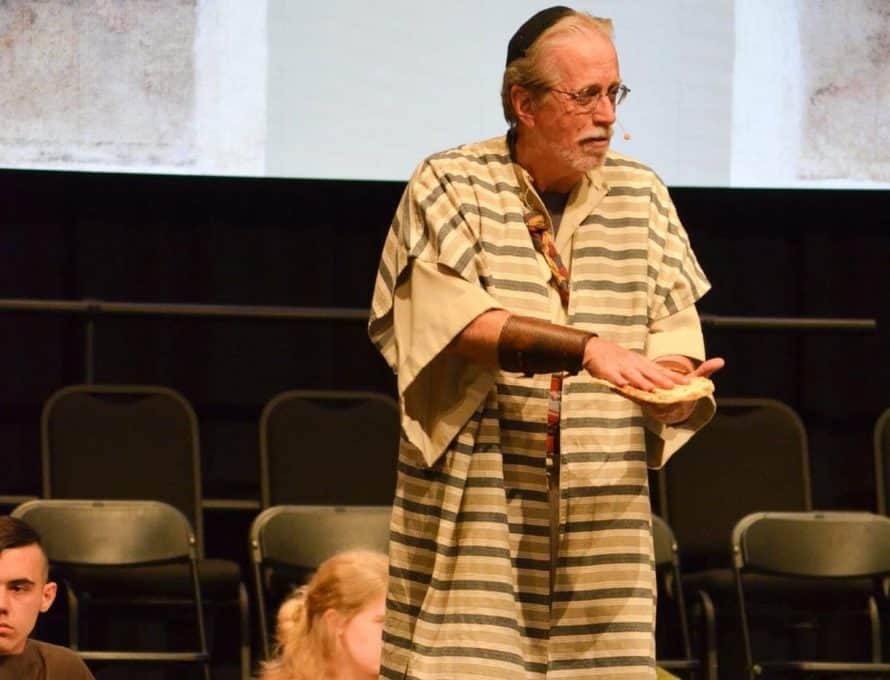WILDWOOD – On Maundy Thursday, the congregation of Fellowship of Wildwood stepped back in time to biblical days to celebrate the Last Supper. Jay McCarl, author, pastor and theologian hosted the event to share his knowledge of biblical customs as well as theology.
“A biblical dinner is NOT a Passover seder meal,” McCarl said. “It is a reenactment of John 13. This part of the dinner is what happens after the ceremonial seder.”
Tim Montgomery, pastor of students, experienced the dinner 10 years ago at his church in Ireland. “We planned to do this in 2020 at Easter,” Montgomery said, “but, COVID changed those plans. Jay’s dinner had a tremendous impact on me when I saw it. I still remember things to this day, and I knew it would be wonderful for our church.”
Montgomery and the rest of the pastoral staff prayed for the results of the dinner. “We prayed the dinner would open eyes to the significance of what happened at the dinner,” he continued, “and the dynamics between the disciples.”
As the dinner began, McCarl discussed the meaning of the bread in front of each guest. “Bread is a miracle to the Jewish people,” he said, “it is the bread of life and keeps them from starving. Bread is held in high esteem. Bread reminds how God provided manna. Jesus used it as a teaching tool.”
McCarl then asked each person to tear off a bite-sized piece of the bread and feed it to the person on their left. The room was immediately filled with laughter as the bread was fed to the neighbor.
“I’ve done this dinner on six continents,” McCarl said, “and laughter is always the result. But this was a serious action for the Jewish people. It proclaimed, ‘You are my brother, I am your friend, I would die in your place, I forgive you.’ It was the greatest honor.”
Montgomery identified what this inside information would do for Bible study. “We want to ignite the excitement to dive into God’s Word. Our church, as others do, focuses on hermeneutics,” he said. “We want to understand Scripture and have a grasp of customs and culture. It opens the context of Scripture.”
McCarl talked about the significance of the seating of the disciples at the Last Supper. “John was in the first seat, Jesus was next in the host position and Judas Iscariot was to his left, seated as the guest of honor,” McCarl said. “Peter was in the last, lowliest seat next to the pot of water and towels that the lowliest slave would use to wash the feet of the guests.”
“They were all amazed,” McCarl continued, “as Jesus got up to wash the feet of every disciple around the table. It showed the full extent of His love as Jesus, the Son of God, became the foot washer of the foot washer, the one in the lowliest seat. Jesus said, ‘I have set an example for you. Now that you know, you will be blessed if you do it for them.’”
McCarl explained the dinner interaction with Judas Iscariot. “He announced to the disciples that one of them would betray him and immediately they wanted to know who was to betray him. Jesus told them that it would be the one he gave a sop to after dipping it. After Jesus dipped the bread, he leaned back and gave it to Judas Iscariot.”
Going back to the earlier lesson, McCarl explained what this important movement meant. “Judas Iscariot, you are my brother, I am your friend, I would die in your place (and I will tomorrow), I forgive you.”
“Although Jesus broke bread with Judas in a place of honor and washed his feet,” McCarl concluded, “Judas left the dinner to betray Jesus.”
Listening to McCarl’s insights gleaned from extensive study gave the entire dinner a new view. “We wanted our people to go beyond seeing the Scripture in black and white,” Montgomery said. “We wanted it to be a technicolor view.”

